Economy
Even as markets rally again, Trump’s policymaking stirs concerns
As Wall Street slowly puts April’s tariff shakeout behind and indexes set record highs, investors remain on edge and wary of U.S. President Donald Trump’s rapid-fire, sometimes chaotic policymaking process and see the rally as fragile.
The S&P 500 and Nasdaq composite index advanced past their previous highs into uncharted territory on Friday. Yet traders and investors remain wary of what may lie ahead.
Trump’s April 2 reciprocal tariffs on major trading partners roiled global financial markets and put the S&P 500 on the threshold of a bear market designation when it ended down 19% from its Feb. 19 record-high close.
This week’s leg up came after a U.S.-brokered cease-fire between Israel and Iran brought an end to a 12-day air battle that had sparked a jump in crude prices and raised worries of higher inflation. But a relief rally started after Trump responded to the initial tariff panic that gripped financial markets by backing away from his most draconian plans.
JPMorgan Chase, in the midyear outlook published on Wednesday by its global research team, said the environment was characterized by “extreme policy uncertainty.”
“Nobody wants to end a week with a risk-on tilt to their portfolios,” said Art Hogan, market strategist at B. Riley Wealth. “Everyone is aware that just as the market feels more certain and confident, a single wildcard policy announcement could change everything,” even if it does not ignite a firestorm of the kind seen in April.
Part of this wariness from institutional investors may be due to the magnitude of the 6% S&P 500 rally that followed Trump’s re-election last November and culminated in the last new high posted by the index in February, said Joseph Quinlan, market strategist at Bank of America.
“We were out ahead of our skis,” Quinlan said. A focus on deregulation, tax cuts and corporate deals brought out the “animal spirits,” he said. Then came the tariff battles.
Quinlan remains upbeat on the outlook for U.S. stocks and optimistic that a new global trade system could lead to U.S. companies opening new markets and posting higher revenues and profits.
But he said he is still cautious. “There will still be spikes of volatility around policy unknowns.”
Overall, measures of market volatility are now well below where they stood at the height of the tariff turmoil in April, with the CBOE VIX index now at 16.3, down from a 52.3 peak on April 8.
Unstable markets
“Our clients seem to have become somewhat desensitized to the headlines, but it’s still an unhealthy market, with everyone aware that trading could happen based on the whims behind a bunch of” social media posts, said Jeff O’Connor, head of market structure, Americas, at Liquidnet, an institutional trading platform.
Trading in the options market shows little sign of the kind of euphoria that characterized stock market rallies of the recent past.
“On the institutional front, we do see a lot of hesitation in chasing the market rally,” Stefano Pascale, head of U.S. equity derivatives research at Barclays, said.
Unlike past episodes of sharp market selloffs, institutional investors have largely stayed away from employing bullish call options to chase the market higher, Pascale said, referring to plain options that confer the right to buy at a specified future price and date.
Bid/ask spreads on many stocks are well above levels O’Connor witnessed in late 2024, while market depth, a measure of the size and number of potential orders, remains at the lowest levels he can recall in the last 20 years.
“The best way to describe the markets in the last couple of months, even as they have recovered, is to say they are unstable,” said Liz Ann Sonders, market strategist at Charles Schwab. She said she is concerned that the market may be reaching “another point of complacency” akin to that seen in March.
“There’s a possibility that we’ll be primed for another downside move,” Sonders added.
Mark Spindel, chief investment officer at Potomac River Capital in Washington, said he came up with the term “Snapchat presidency” to describe the whiplash effect on markets of the president’s constantly changing policies on markets.
“He feels more like a day trader than a long-term institutional investor,” Spindel said, alluding to Trump’s policy flip-flops. “One minute he’s not going to negotiate, and the next he negotiates.”
To be sure, traders seem to view those rapid shifts in course as a positive in the current rally, signaling Trump’s willingness to heed market signals.
“For now, at least, stocks are willing to overlook the risks that go along with this style and lack of consistent policies, and give the administration a break as being ‘market friendly,'” said Steve Sosnick, market strategist at Interactive Brokers.
Economy
Türkiye advances toward exit from FX-protected scheme
The planned exit from the FX-protected scheme, which Turkish authorities began to scale back in 2023 along with the shift to more conventional economic policies, appears to be on track, recent data shows.
The latest banking data, shared on Thursday, revealed that the stock of FX-protected accounts, or the so-called KKM, has fallen further below TL 600 billion ($15 billion) from TL 3.4 trillion in August 2023.
The KKM balance decreased by nearly TL 7 billion last week to TL 559.3 billion, according to the data from the Banking Regulation and Supervision Agency (BDDK). Thus, the KKM size accounted for 2.46% of total deposits, the data revealed.
Expectations are that this share will drop further and that the accounts will be fully phased out by the end of the year.
This decline is also seen as a sign of renewed confidence in the Turkish lira. According to experts, this process also aligns with the goal of curbing inflation.
Annual inflation in Türkiye has eased to as low as 35.4% in May, according to the official data. The inflation data for June is due to be announced this Thursday.
Under the KKM scheme, adopted in late 2021 to help reverse dollarization and counter a steep fall in lira, the Turkish central bank has been protecting deposits by covering depreciation costs.
But authorities have been seeking to phase it out gradually and transition deposits into regular lira accounts, in part by dissuading companies and individuals from renewing the KKM accounts.
Treasury and Finance Minister Mehmet Şimşek noted recently that exiting from the FX-protected scheme was “an important goal,” mentioning that they will “probably end this practice soon.”
The Central Bank of the Republic of Türkiye (CBRT), in its yearly road map for 2025, said it aimed to end the scheme, which has heavily weighed on the budget, this year.
“FX-protected deposits were introduced as a macroprudential measure. The deposit balance reached its peak in August 2022, but has been declining since the second half of 2023. There has been a strong downward trend in this balance for nearly two years,” Harun Türker, a faculty member at Ankara Medipol University, told public broadcaster TRT Haber.
“The decrease in KKM actually reflects trust in the Turkish lira and confidence in the new combination of monetary policy implemented during the disinflation process. As confidence in the Turkish lira increases, we observe a corresponding decrease in FX-protected deposit balances,” he added, according to remarks published on Sunday.
“At the beginning of the year, the central bank said that this could be concluded within the year. With the acceleration of the process, we may witness the full elimination of the FX-protected deposit balance,” he stated.
Economy
Turkish exporters could see benefit in stronger euro: Expert
Turkish exporters see the rise in the euro/U.S. dollar exchange rate as a potentially beneficial development, an expert opined recently, while the uncertainties over the independence of the Federal Reserve (Fed) continued to fuel concerns.
U.S. President Donald Trump is reportedly considering selecting a new name to chair the Fed in September or October. The Fed’s likelihood of making three rate cuts by the end of the year increased, causing the euro/U.S. dollar exchange rate to rise to 1.1745 this week, a nearly four-year high.
The decline in the U.S. dollar showed that investors responded to Trump’s decisions by selling their dollar assets, putting downward pressure on the U.S. Dollar Index, which fell to 97.076 on Thursday, its lowest since March 2022.
Tonguç Erbaş, general manager of Türkiye-based financial services firm Ahlatci Portföy, told Anadolu Agency (AA) on Friday that the rise in the exchange rate has been positive for Turkish exporters, and the European Central Bank (ECB)’s tight monetary stance to bring down the bloc’s inflation to 2% also contributed to the rise.
Erbaş stated that the ECB is gradually easing its policy to bring stability to the EU economy, while concerns over tariffs are largely limited, boosting market confidence. Meanwhile, the Fed remains cautious amid debates that Trump could likely install a “shadow chair” to the Fed.
“The rise in the euro/U.S. dollar exchange may have been positive for Turkish exporters because half of Türkiye’s exports go to Europe, but most of our imports are dollar-based,” he said.
“The rise in the exchange rate is allowing euro-based revenue to increase when converted to Turkish lira,” he added.
Erbaş noted that the Turkish industrial sector in particular could benefit from the exchange rate, but the exchange rate risk on the import side needs to be monitored closely.
Türkiye’s exports totaled $110.9 billion in January-May this year, 39% of which were to the EU, up 7.5% versus the same period last year, according to the data from Turkish Exporters’ Assembly (TIM).
Economy
Erdoğan unveils new credit packages to boost agriculture, livestock sectors
President Recep Tayyip Erdoğan shared on Saturday details of the new packages aimed at supporting farmers and producers in the country in different areas, while also recalling substantial financing provided so far.
Delivering a speech at Ziraat Bank’s “4th Agricultural Ecosystem Gathering” in Istanbul, Erdoğan said that the agricultural loans provided by the lender have exceeded TL 700 billion ($17.54 billion). He also expressed that the bank, known for its tradition of supporting agriculture, accounts for 71% of all credits in the sector.
Also stating that Ziraat Bank has prepared a successful credit package that suits the needs of the sector and expectations, the president went on to provide the key details regarding the new package.
“With ‘Işim Ziraat Kredisi’ we provide loans to our farmers in many areas at attractive opportunities,” he said.
“We are supporting our producers who want to set up greenhouses to grow vegetables and fruits with a new credit package,” he added.
“In this context, for financing greenhouse investments under 10 decares, we are offering a credit opportunity of up to TL 10 million with a maturity of up to 10 years and a one-year principal payment-free period,” he further explained.
The president also mentioned that while 20% of the investment amount is required as equity, he said that this ratio will be 10% in the case of young and female farmers.
“We are currently providing investment credit of up to TL 5 million with a maturity of up to seven years and a one-year principal payment-free period for the purchase of animals for the capacity increase of enterprises engaged in cattle and dairy farming without seeking equity,” he also said.
“Of course, we do not neglect our small cattle producers. We are paving the way for our small cattle producers who want to expand their scale, increase their animal stock and use their idle capacities for production,” said Erdoğan.
In line with this, he further suggested they were increasing the limit of small cattle loans under the project dubbed “I Have Many Reasons to Live in My Village,” which is carried out in cooperation with the Agriculture Ministry and Ziraat Bank, from TL 600,000 to TL 1.2 million.
“I hope that the credit opportunities will be beneficial and auspicious for our farmers,” he added.
Furthermore, the president reiterated that farmers who suffered damage from frost will be supported, while also noting that the effects of the climate crisis are being felt more. Erdoğan noted that they determined their water, agriculture and livestock policies with great seriousness, guided by this bitter truth.
Vegetable and fruit producers in many provinces in Türkiye were impacted by harsh frost earlier this year. The frost affected the production of key crops, including apples, apricots, grapes and walnuts, among others.
“We have recently implemented some revolutionary regulations. We have started production planning. We are deciding which product will be produced where and in what quantities,” he maintained.
Soil mapping, agricultural census
“Regarding soil survey and national soil mapping, we have provided $143.5 million of financing from the World Bank for 28 million hectares of agricultural and pasture land; work has been completed in 2.5 million hectares, and work continues in 6 million hectares,” he informed.
“We will update all data from land size to product pattern with the agricultural census we will start on July 1. I call on all our farmers to support the work to be carried out with the coordination of the ministry and TurkStat,” he added, referring to the Turkish Statistical Institute (TurkStat).
At the same time, he also called on farmers to obtain agricultural insurance.
Also mentioning the amounts of financing provided in the past, Erdoğan said: “Last year, we provided grants totaling TL 755 million to 71,000 people in 15 provinces. This year, we have allocated a budget of TL1.3 billion for our projects.”
“In other words, we, as the state, are and will continue to support those who work, produce, export, invest and generate jobs with all our means,” he vowed.
Economy
Trump halts US-Canada trade talks over digital tax on tech firms
President Donald Trump on Friday announced the United States is terminating trade talks with Canada in response to Ottawa’s plan to impose a digital services tax on American technology companies, calling it a “blatant attack” on the U.S.
“Based on this egregious tax, we are hereby terminating ALL discussions on trade with Canada, effective immediately,” Trump said in a post on Truth Social.
He added that the U.S. would notify Canada of new tariffs “within the next seven-day period.”
Trump said he was informed that Canada’s proposed digital services tax targets American tech giants, accusing Ottawa of mimicking the European Union, which is also in discussions with Washington over similar measures.
“They are obviously copying the European Union, which has done the same thing and is currently under discussion with us, also,” Trump wrote.
The move adds a new hurdle to already stalled trade negotiations between the two countries, which have been locked in a tariff dispute for months despite some recent signs of progress.
Economy
Türkiye, Russia pledge deeper economic ties at joint gathering
Trade Minister Ömer Bolat said Friday that Türkiye and Russia are continuing to strengthen their economic relations, emphasizing that the resilience and complementary nature of both countries’ economies offer ample opportunities for deeper cooperation.
Speaking at the 19th session of the Turkish-Russian Intergovernmental Joint Economic Commission (JEC) in Moscow, Bolat highlighted the strategic importance of both nations as regional neighbors and key players.
“The commercial and economic partnership developed over the years between Türkiye and Russia has laid the foundation for peace and stability in the region,” Bolat said.
He noted that President Recep Tayyip Erdoğan and Russian President Vladimir Putin are committed to advancing bilateral relations and working together to meet the mutual goal of increasing trade volume to $100 billion (TL 3.99 trillion).
Despite global and regional challenges, Bolat said the two countries have made significant progress in their relations. “Our joint work with Russia and our major, visionary projects are expanding. We aim to carry our future projections into the second quarter of the 21st century in line with national and international obligations, to contribute to the development of our regions, countries and peoples,” he said.
Bolat added that a memorandum of understanding to be signed at the conclusion of the JEC meeting, along with its accompanying agreements, would further boost economic and trade ties between the two nations.
Recalling the shocks Türkiye has faced in recent years, including the COVID-19 pandemic and a devastating earthquake that struck 11 provinces, Bolat thanked Russia for its aid during the disaster. “Despite the difficulties, under President Erdoğan’s leadership, our country has shown resilience and has largely overcome these challenging times,” he said.
Bolat pointed to Türkiye’s uninterrupted growth over the past 19 quarters, noting that the economy grew by 3.2% last year, reaching a size of $1.3 trillion. He said exports, which stood at $36 billion in 2002, surged to $262 billion in 2024 – nearly a sevenfold increase.
“The undeniable potential of the Turkish economy is resonating globally,” Bolat said. “The World Bank recently revised Türkiye’s 2024 growth forecast upward from 2.6% to 3.1%.”
Bolat also praised Russia’s economic performance, saying it exceeded global expectations. According to International Monetary Fund (IMF) data, the Russian economy grew by 4.1% in both 2023 and 2024.
Thanks to JEC meetings, Bolat said Türkiye and Russia have been able to develop a multi-layered and wide-ranging economic relationship. “Our regularly held high-level Joint Economic Commission meetings are a clear result of this dynamic interaction,” he added.
Economy
Türkiye’s economic confidence rises slightly to 96.71 in June
Türkiye’s economic confidence index edged up 0.1% in June to 96.71, according to data released Thursday by the Turkish Statistical Institute (TurkStat).
The index stood at 96.65 in May.
The consumer confidence index rose 0.3% month-over-month to 85.1, while the real sector confidence index, which reflects sentiment in manufacturing, slipped 0.2% to 98.4.
Confidence in the services sector climbed 0.4% to 110.9, but sentiment in the retail trade and construction sectors declined. The retail trade confidence index dropped 2.5% to 108.5, and the construction confidence index fell 1.7% to 86.9.
The economic confidence index is a composite indicator that reflects the general economic outlook based on consumer and producer evaluations.
-

 Daily Agenda2 days ago
Daily Agenda2 days agoFETÖ operation in 46 provinces: 361 suspects were caught
-

 Daily Agenda2 days ago
Daily Agenda2 days ago32 arrests in parsley doner operation connected to FETÖ
-

 Daily Agenda2 days ago
Daily Agenda2 days agoCrypos were deciphering – Breaking News
-
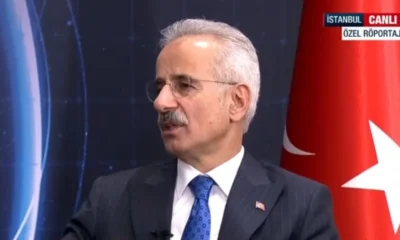
 Daily Agenda3 days ago
Daily Agenda3 days agoMinister of Transportation Abdulkadir Uraloğlu in AHABER: We are a role model for cyber security
-
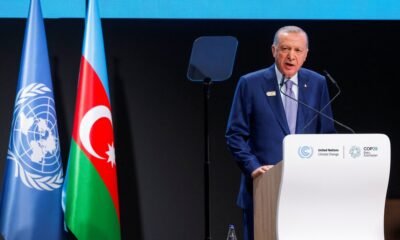
 Politics2 days ago
Politics2 days agoTürkiye, Australia battle to host 2026 UN climate talks
-
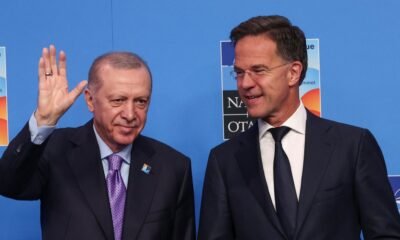
 Politics3 days ago
Politics3 days agoTürkiye supports NATO’s 5% defense budget goal
-
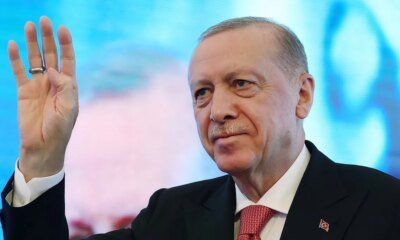
 Daily Agenda3 days ago
Daily Agenda3 days agoThey cannot prevent urban transformation – Breaking News
-
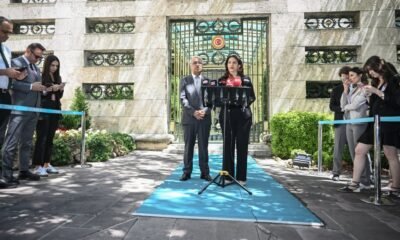
 Politics2 days ago
Politics2 days agoParliament under spotlight in new phase of ‘terror-free Türkiye’




